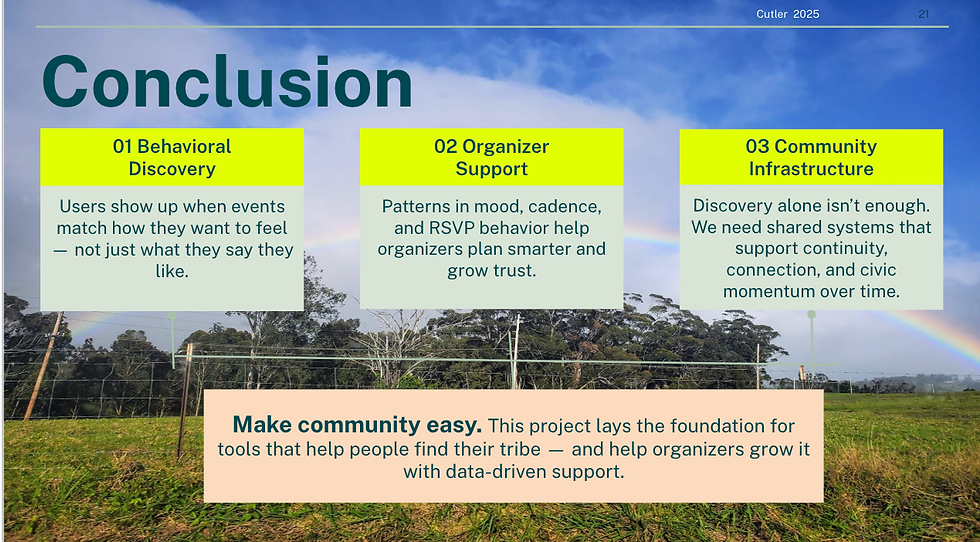Community Agent Capstone
- Vigi Water

- Aug 12, 2025
- 3 min read
Define Your Vibe, Find Your Tribe: What I Learned Building Community Agent

Last summer, I was working in Public Programs when I noticed something that bothered me. Amazing community events were happening all around the city, but they were consistently under-attended. Meanwhile, I kept hearing friends say: "I want to get involved in my community, but I don't know where to start."

This wasn't a supply problem. Events existed everywhere. This was a matching problem.
That observation became my Master's capstone project: Community Agent, a platform designed to help people find community events based on vibe, not just category. And what I discovered completely changed how I think about community engagement.
The Big Insight: Vibe Is Greater Than Category
Traditional event platforms sort by activity type—yoga, volunteering, networking—but they completely miss what experiences actually feel like. Through my research, I realized that a unicycle festival has way more in common with a Mermaid Parade than with cycling events. Both are playful, DIY, family-friendly experiences. But current systems would never connect someone who loved one to the other.
I talked to dozens of organizers and event-goers, plus industry leaders from companies like Idealist and Cheersy. What emerged was this fundamental mismatch: organizers knew exactly what their events felt like—"chill and intimate" or "high-energy networking"—but had no scalable way to communicate that vibe. Meanwhile, potential attendees faced the anxiety of "Will I actually fit in?" without any way to predict compatibility.
What the Data Revealed
I analyzed over 126,000 RSVPs from Nashville meetups and processed 749 NYC volunteer opportunities. The patterns were fascinating:
44% of people attended only one event—they were looking for the perfect fit, not maximum options
79% stuck to one category, suggesting strong personal interest alignment
But here's the kicker: 43.6% of hikers also attended dance meetups, revealing shared energy patterns that traditional categorization completely missed
People don't just want "outdoor activities." They want either low-key garden social clubs or high-intensity trail maintenance—completely different vibes under the same category.
The Solution: Start With Organizers
Community Agent works by giving organizers tools to define their event's personality using mood tags, energy levels, and atmosphere descriptions. Then attendees provide post-event feedback, creating a shared learning ecosystem where recommendations get smarter with every interaction.
The platform I built processed events across six themes, matching users based on current mood, availability, and preferred social atmosphere—not just stated interests. It's about finding where you'll actually belong and return, not just what looks interesting.
Testing Revealed Everything
User testing was humbling and eye-opening. When I asked "How can I help you find events?" people didn't know what to search for. But when I specified "volunteer events" and added suggestions, discovery became easier. The biggest lesson: "I don't even know what exists out there" came up repeatedly. Platforms need to act like thoughtful hosts, not databases.
I also learned that social proof doesn't matter here. Unlike social meetups, community events are about expanding circles, not reinforcing existing relationships. Users consistently said they don't need to see which friends are attending—they want independence in community exploration.
The Bigger Vision
This project convinced me that we need to shift from generic event discovery to personalized community intelligence. When we can quantify and match on vibe rather than category, we create pathways for authentic connection and sustained engagement.

The implications go way beyond events. This applies to any community matching challenge—civic engagement, professional development, environmental action. In a world where 75% of people want more community involvement but struggle to find the right opportunities, we need data-driven solutions that help people define their vibe and find their tribe.

That's exactly what I'm exploring here at Vigi Water: how do we use these insights to build stronger communities around environmental action? Because transformational movements don't happen through individual behavior change—they happen when communities feel genuinely connected to each other and their shared spaces.
Vigi






Comments